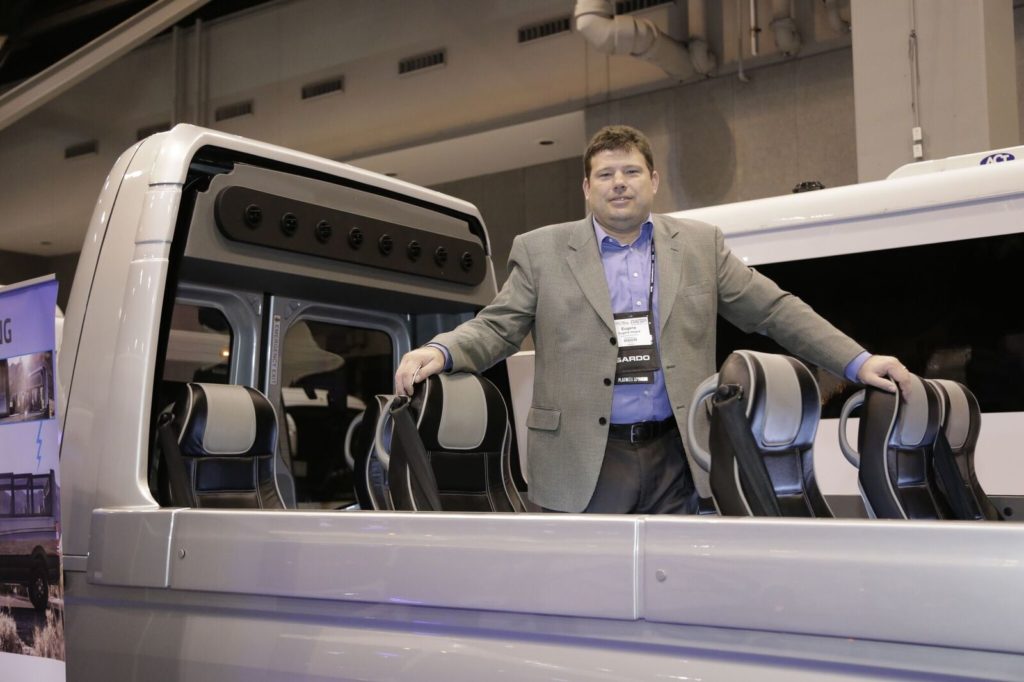
ST. LOUIS — More than a dozen new and returning exhibitors brought their products and services to UMA Motorcoach Expo 2017 in St. Louis, adding to the hustle and bustle of the show floor.
Here is a rundown on some of the exhibitors and their wares:
Caleche USA
It’s an open-top tour bus. It’s a panoramic, climate-controlled tour bus. It’s two buses in one — the Caleche USA convertible based on the Mercedes-Benz Sprinter chassis.
Caleche (the French word for carriage) began working on the telescoping top concept in France five years ago, said Robin Verachtert, president of Caleche USA.
“We cut the top off and do a lot of reinforcing of the roof, floor and the seat base to make it safe and compliant,” Verachtert said. “Then we install the roof system, which has three parts with two engines on each side that are synchronized.
“This is for operators who do sightseeing but don’t want to have just a sightseeing vehicle.”
Eugene Hotard, executive vice president of Alliance Bus Group, the eastern U.S. distributor of the Caleche vehicles, said when the weather is great the top can be opened.
“If the weather turns, you can close the top on a dime and your clients will still have a very panoramic, open-air feel,” Hotard said. “We can start at 10 passengers and go up to 19, with or without a wheelchair lift.”
Caleche buses, which are equipped with four- or six-cylinder diesel engines, sell for $155,000 to $165,000, he said.
Rally Bus
Rally Bus was a first-time exhibitor at Motorcoach Expo after accomplishing a historic feat — assisting in transportation planning for the Women’s March on Washington in January.
“We sent 48,000 people on 800 buses using 135 operators. In certain cities we had 500 or 1,000 people getting picked up with half a dozen operators,” said Bennett Krejci, director of strategic partnerships at Rally.
Rally, he said, “is a technology platform positioning between the motorcoach industry and our riders. We give individuals and small groups the ability to buy seats on a motorcoach that they otherwise wouldn’t have access to. We connect them, aggregate them and build productive bus trips. For an operator who may not have a solution for one or two or five individuals, we can piece them together and bring new demand.”
Operators who join Rally are sent a computer tablet that links them to Rally’s e-ticketing system and GPS (global positioning system) tracking to connect them with riders and plan for pickup locations.
“It also allows riders to know where the bus is,” Krejci said. “We have been in business about five years. We have been building traction around events, primarily sporting events, NASCAR races, music festivals, concerts and political rallies. We are able to route dynamically, based on where people are signing up.”
Interglass Oto Camlari
The family owners and operators of Interglass Oto Camlari traveled from Adana, Turkey, to their first trade show in the United States.
“We are a small, family-owned company,” said President Harun Erdemir. “We are mainly in automotive glazing and make original equipment for Temsa. We are mainly focused on the aftermarket in Europe. For a small company like us it is very difficult to get business with the original equipment manufacturers in Europe.”
The family approached Motorcoach Expo as an exploratory mission.
“We are just trying to understand what our strategies should be to enter the U.S. market,” said Gamze Erdemir Severoglu, Harun’s wife and the managing director of the company.
PriorityStart
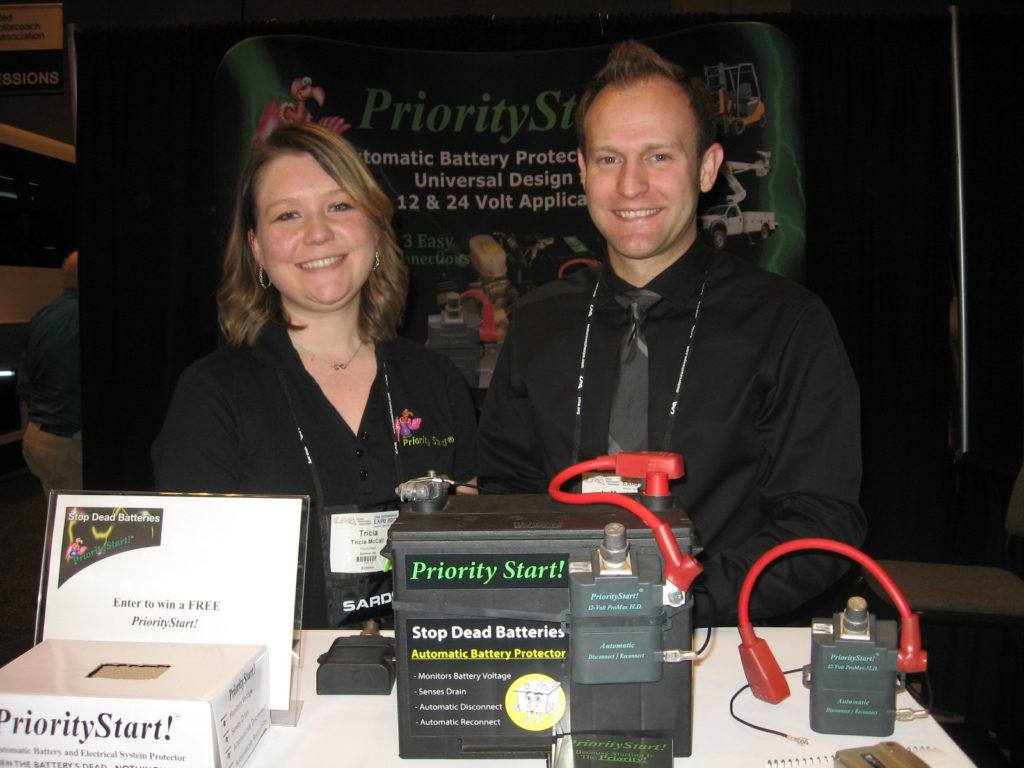
Any breakdown is embarrassing, particularly when it is caused by a dead battery. PriorityStart! displayed its electronic battery preservers that stop electrical drains while there is still enough power for an engine start.
“Priority Start! is a completely automatic disconnect for battery systems. Even if a vehicle has multiple batteries there is just one unit for that vehicle,” said LaMotte McCall, manager of company.
“It goes between the battery and the electrical system. If there is a drain when the vehicle is turned off, we allow the batteries to drain down to 11.7 volts. Once it is at that state for one minute, the unit will isolate the battery or batteries and it will stay there until the user needs power,” McCall said.
When the user turns the ignition switch or activates a courtesy light by opening a door, the unit reconnects the battery.
“When someone gets back in the vehicle and creates a load charge of 0.2 millivolts, the PriorityStart! will sense that, re-engage to give full power back and allow the vehicle to start,” he said.
The company’s 12-volt ProMax HD handles up to 1,600 starting amps and 400 continuous amps. The 24-volt unit, for 24-volt systems, also handles those amperage loads and disconnects when voltage drops to 23.6 volts.
The 12-volt unit is priced at $129.95 and the 24-volt unit at $140, McCall said, with discounts for quantity purchases.
1st Source Bank
Amanda Lundmark, assistant vice president of 1st Source Bank, said motorcoach operators benefit from dealing with lenders that understand their equipment and their industry.
“When a customer calls us and tells us they are looking at an MCI or a Van Hool, we know exactly what they are looking at and can give them quicker approval,” Lundmark said.
“A financial partner that is knowledgeable about the vehicles and basics of the industry is able to streamline application processes and provide appropriate terms.”
She said the company’s biggest focus is on motorcoaches, but it also provides financing for shuttle buses.
“We know a lot of the operators. We do financing and leasing. We offer credit limits as well as one-off and two-off bus transactions,” Lundmark said.
“If you go to your local bank, they are going to ask for everything in the world. They don’t understand the equipment so they are going to be a lot more concerned. We understand the equipment and the collateral value. For a transaction under $350,000 we try to give an approval within four hours. If the customer is looking for residual at the end, we can look at their financials and help to guide them to make sure they are making a good decision.”
REV Bus Group
Krystal and Federal commercial luxury buses were shown at Motorcoach Expo but account for just two of the 27 brands housed under REV Bus Group of Miami, Fla., said company President John Walsh.
“About a third of our business is in buses. We have eight bus manufacturers and two fit this market for tours and charters,” he said. “They are very high-end, smaller buses for up to 44 passengers, which makes them a smaller product than the (55-seat) motorcoaches.
“They are great products that come in at a price point that is more competitive for that number of passengers. It seems to work really well for this market.”
Walsh said he detected enthusiasm on the show floor during Expo.
“There is a lot of pent-up demand,” he said. “A lot of people waited for the election to be over and there is a lot of aging equipment that needs to be replaced. We are excited about the replacement cycle. As older vehicles are not replaced, the business for parts and aftermarket services will be bright for us. We are seeing all upside right now.”
Icomera
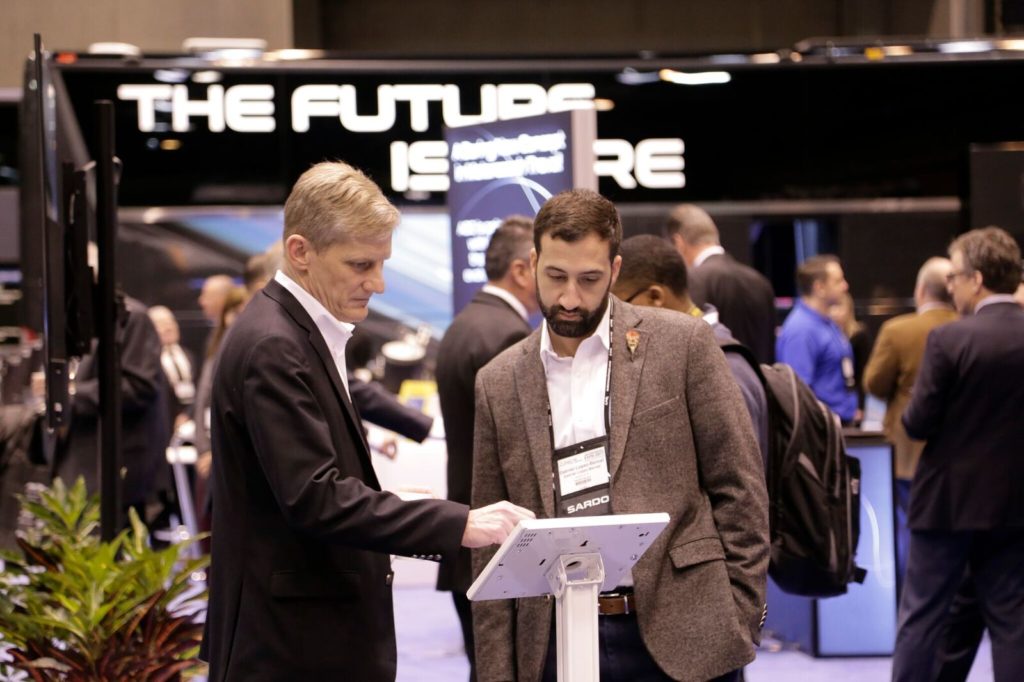
Icomera, founded in Goteborg, Sweden, in 1999 to serve the European rail industry, offers a wireless router for the transportation industry with a wide range of products, from basic Wi-Fi to a sophisticated system that can act as a central hub for all onboard systems, said Matt Hardison, president of Icomera U.S. Inc., of Rockville, Md.
“We can carry onboard entertainment or integrate telematics,” he said.
Icomera’s U.S. branch opened in 2014.
“We are on the Amtrak Acela Express trains and are talking with Amtrak about expanding to replace their legacy systems on other trains,” Hardison said.
“In the U.S. market motorcoach is about 80 percent of our business. Even on our basic unit level our Wi-Fi devices are configurable so you can determine how much bandwidth you want to provide in the aggregate and also at the customer level,” he said. “Our systems, because they are designed for the transportation industry, are hardened to deal with temperature range, vibration and shock and work consistently every time.”
Access Commercial Capital
Eric C. Coolbaugh has returned to the motorcoach financing business as co-founder and vice-president of Access Commercial Capital of Lake Success, N.Y.
“I have been in this industry about 30 years. My last business was Advantage Funding, which I sold in 2014 and signed a two-year non-compete (agreement). I am now back in the industry,” Coolbaugh said.
Access Capital is involved in the entire transportation industry, with the motorcoach and limousine/livery segments being major assets. The company also finances school buses, ambulances and taxis, he said.
“The people who are here (at Expo) need to deal with an industry specialist that understands their assets. Bankers don’t have any idea that that bus is a half million-dollar asset. There are a lot of nuances in this business. Leverage ratios are high. Banks aren’t used to that,” Coolbaugh said. “You need somebody who understands this business to get you the right deal at the right price and still be there seven years from now when it comes due.”
DriveWare
Transportation management software for passenger carriers is the focus of DriveWare, a past exhibitor that returned for Motorcoach Expo 2017, said President Jay Hosseinian. The company is based in Laguna Hills. Calif.
“We have software that handles everything from generating quotes to work order confirmation and invoicing,” he said. “It also handles vehicle maintenance, driver management, payroll, scheduling of vehicles and drivers and schedule emails. The latest thing we have is digital signature, or e-signature, so contracts can be sent electronically to customers and they can sign on their phone or mobile device.”
Motorcoach Safety Training Company
A new motorcoach-specific training course designed for drivers will be released in May by Motorcoach Safety Training Company of Hudson, Ohio.
“We create a training curriculum specific to motorcoach drivers,” said Maureen Gaeta, training product specialist for the company. “It is a video-based program intended to be used by trainers in a classroom style of training.”
The company also offers a training program for commercial driver’s license training that is available as a Web-based product or in hard copies accompanied by CDs, she said.
SmartTray
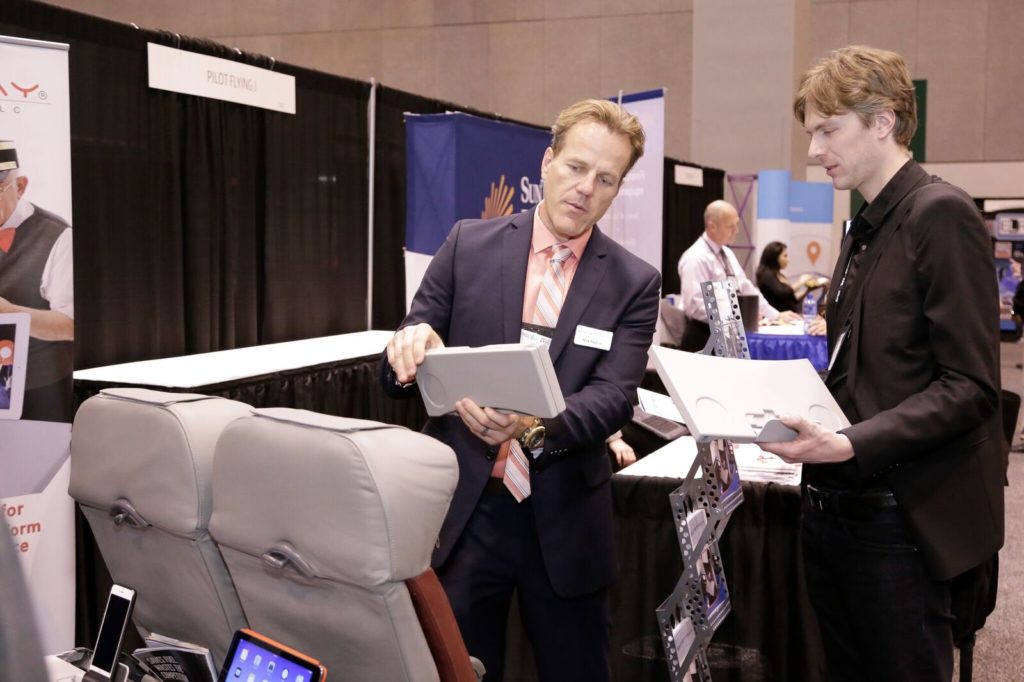
SmartTray, with product placements on airliners and trains, introduced its devices to a new audience at Motorcoach Expo. SmartTray addresses a recent but widespread issue in travel — managing snacks, drinks and a mobile device on that small, drop-down tray table.
“We are now providing customers in the bus industry with an integrated holder solution for the tray table,” said Nick Pajic Jr., vice president of product management at SmartTray, based in Scottsdale, Ariz.
“A lot of customers in the bus industry have told us that their original equipment suppliers give them a tray solution but it currently is not effectively made. It is very easy to break and there are no solutions for passengers who bring their devices.”
The SmartTray device can be flipped up when the tray table is lowered. It contains a locking device that holds a personal electronic device upright at a viewable angle.
“On a tray table you have a limited amount of space and you need to capitalize on that space,” Pajic said. “The holder clamps against your device safely and elevates it slightly above the table to protect it from spills.”
SmartTray holds eight patents for its products and is working on additional technology that will incorporate a USB 2.0 Type C connection and a wireless charging device into the trays.
Smartstubs
Smartstubs of Seattle, Wash., specializes in real-time mobile and synchronized management of ticketed rides.
“We are a ticketing management solution that works with any type of per-capita business — line runs, shuttles, tour groups, any sort of individual ticket sales,” said Smartstubs President Carson Scheidel.
“Our clients create their products, define pricing, inventory, locations and all the variables of their products. Then we build websites for them, integrating into their website a portal for people to buy tickets,” Scheidel said.
The company offers an Android application for people to do in-person sales and a Web application for call center concierge sales.
Smartstubs can improve the tracking of tickets and reduce administrative effort. “A lot of motorcoach companies are using very manual processes with a lot of paper that drivers have to collect,” he said. “Our intent is to capture that electronically.”
Zonar
Zonar provides an electronic-logging device that includes patented, enhanced features that encourage drivers to make detailed pre-trip vehicle inspections.
“We use RFID (radio frequency identification) technology to force drivers to do more than a pencil checklist for their DVIR and walk around the vehicle to look for defects,” said Matt Dickey, regional account manager for Seattle-based Zonar.
Zonar places RFID tags at locations around a vehicle. These unpowered tags activate a screen on a tablet device that prompts the driver to verify that each component in that area is inspected, Dickey said.
“We can allow up to 11 zones. After the driver scans all 11, the device asks if the inspection is complete. The driver can certify the report, hit the submit button then dock the tablet back in the cab,” he said.
“The device uploads that inspection. If any defects are found it will notify the mechanic in real time by text or email.”
The program is customizable to each motorcoach so it can include items such as doors, lights and audiovisual equipment. The tablet also can take pictures of defects that can be attached to the downloaded inspection report.
CURIS Bio-Decontamination
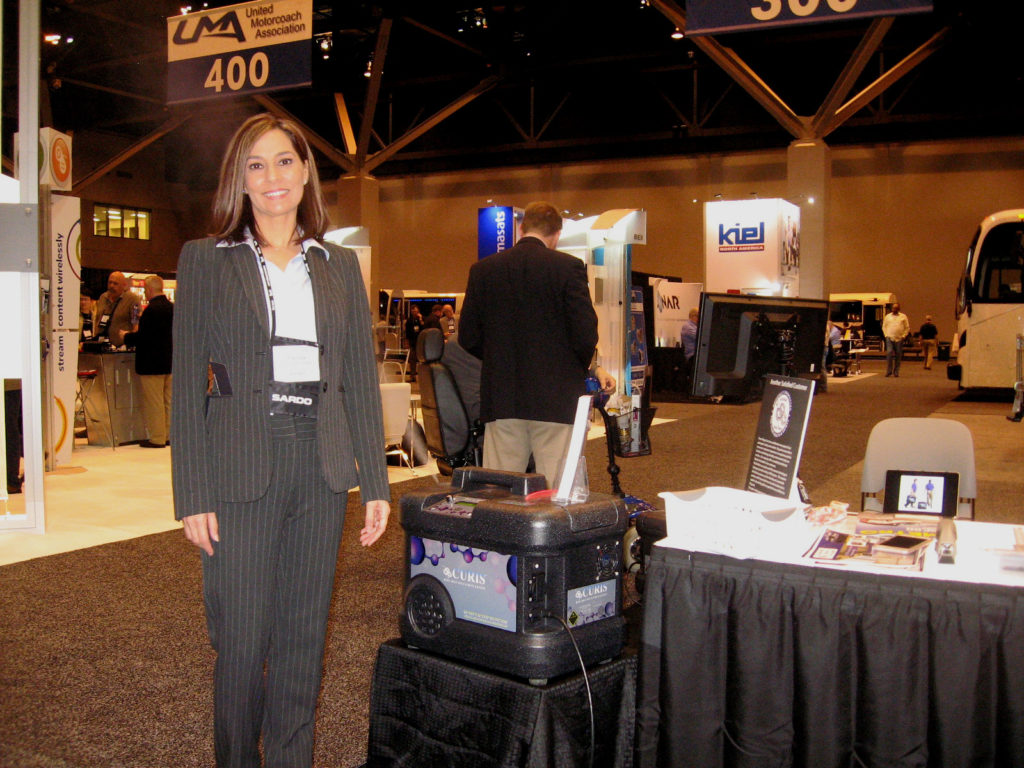
Surfaces in 68 percent of buses in a major metropolitan area were contaminated with an antibiotic-resistant virus, according to a 2014 study published in the American Journal of Infection Control.
Methicillin-resistant staphylococcus aureus (MRSA) is a skin infection caused by a type of staph bacteria that has become resistant to many antibiotics and once was found only in hospitals.
“These bugs have migrated out of hospitals. That study is probably a good representation of what we see across the country,” said Frances Grinstead, vice president of sales and marketing for CURIS in Oviedo, Fla. “Spraying and wiping techniques to clean surfaces really don’t work.”
The Curis Bio-Decontamination System fills a space, such as an operating room or motorcoach cabin, with a fine mist of hydrogen peroxide that disinfects surfaces then decomposes to water and oxygen. The unit fills the closed space then pulses to maintain a mist.
“It takes 30 minutes to treat a coach,” Grinstead said. “The product has a silver component that is left behind. Silver is a great biostat that continues to provide an anti-microbial that is left behind between decontaminations.”
The 36-pound CURIS unit is about the size of a carry-on suitcase and costs $7,999. One gallon of chemical, which will treat 10 to 12 buses, is $69.99.




